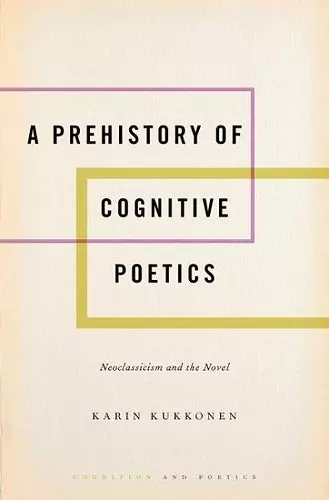A Prehistory of Cognitive Poetics
Neoclassicism and the Novel
Format:Hardback
Publisher:Oxford University Press Inc
Published:27th Apr '17
Currently unavailable, and unfortunately no date known when it will be back

This study provides an introduction to the neoclassical debates around how literature is shaped in concert with the thinking and feeling human mind. Three key rules of neoclassicism, namely, poetic justice (the rewards and punishments of characters in the plot), the unities (the coherence of the fictional world and its extensions through the imagination) and decorum (the inferential connections between characters and their likely actions), are reconsidered in light of social cognition, embodied cognition and probabilistic, predictive cognition. The meeting between neoclassical criticism and today's research psychology, neurology and philosophy of mind yields a new perspective for cognitive literary study. Neoclassicism has a crucial contribution to make to current debates around the role of literature in cultural and cognition. Literary critics writing at the time of the scientific revolution developed a perspective on literature the question of how literature engages minds and bodies as its central concern. A Prehistory of Cognitive Poetics traces the cognitive dimension of these critical debates in seventeenth- and eighteenth-century Britain and puts them into conversation with today's cognitive approaches to literature. Neoclassical theory is then connected to the praxis of eighteenth-century writers in a series of case studies that trace how these principles shaped the emerging narrative form of the novel. The continuing relevance of neoclassicism also shows itself in the rise of the novel, as A Prehistory of Cognitive Poetics illustrates through examples including Pamela, Tom Jones and the Gothic novel.
Karin Kukkonen's important book proposes several innovative theses. It argues that European neoclassicist literary theory was an early incarnation of present-day cognitive poetics, that the rules governing a given literary genre during a definite historical period, in this case seventeenthand eighteenth-century neoclassicist poetics of drama, were equally applied to other genres, and that, consequently, the eighteenth-century English literary wave called "the rise of the novel" was deeply indebted to the neoclassicist views on literature ... To conclude, Kukkonen's book represents the promising debut of a very talented young scholar and will certainly enjoy the success it deserves. * Thomas Pavel, Modern Philology *
The book radiates from a vigorous hypothesis, that of a kinship between eighteenth-century neoclassical poetics and present-day cognitive poetics. Karin Kukkonen, whose solid background in contemporary literary theory and textual criticism is indisputable, substantiates her persuasive argument with a wealth of case studies from eighteenth-century English and French novels. The bringing together of neoclassical poetics, the emergent novel and modern cognitive poetics proves to be a winning strategy for extending our knowledge of eighteenth century literature and culture. * Rosamaria Loretelli, Università di Napoli Federico II, Vice-President of the International Society for Eighteenth-Century Studies *
The author terms her synthesis of neoclassical criticism and brain-body science a "cognitive poetics", but this is too modest; it is also a literary history, a theory of reception, and a demonstration of how heuristics such as situational logic, comeuppance clockworks, and Bayesian cognition can benefit literaty studies. Highlights include chapters on cheater detection in Richarson's Clarissa, cognitive estrangement in Utopian fiction, and free indirect perception in Walpole's The Castle of Otranto. This is a meticulously edited, generously documented, and profoundly erudite book. * P.D. Collington, Niagara University, CHOICE *
ISBN: 9780190634766
Dimensions: 163mm x 239mm x 28mm
Weight: 536g
288 pages